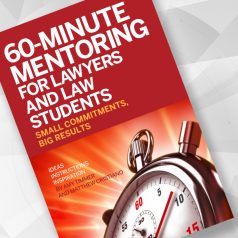Young lawyers often reach out to me as a mentor when they’re thinking of changing jobs, whether that is to another law firm, toward being in-house counsel, or away from the practice of law altogether. Contrary to what most of them expect to hear, I can’t answer that question for them. The answer reveals itself after we talk things through and run through a few exercises.
If you are unhappy or feel like you’re stagnating and want to explore leaving your law firm, perhaps this process can help you as well.

First, Explore Your Reasons for Leaving a Law Firm Job
It is surprising how many young lawyers haven’t really thought about why they want to make a change. Without knowing the exact reasons, the old adage “the grass isn’t always greener” can ring true. You could leave one situation for an equal or worse situation in another law firm or legal department just as easily as a better one — if you haven’t taken the time to figure out what you’re running away from or looking for in your career.
Is it a particular firm partner, practice group or legal practice area?
Is it compensation or benefits?
Is there a lack of mentoring and training for firm associates?
Enough diversity?
Is it the number of billables or the expectation to bring in business?
Do you get meaningful work and get exposure to the law firm’s clients?
What does the partner track look like? Do you want to be a partner?
Do you have a life outside of work?
Is it the law firm’s culture or values?
Once you have a list of what’s missing in your position and what you want, you can figure out whether those things can change at your current place of work with artful advocacy and political navigation. Or, it will become more clear that what you want can only be gained by leaving your law firm. This list will also help you analyze opportunities as they unfold, acting like a measuring stick.
Your “State of the Union” Pros and Cons List for Your Current Job
I recommend getting into the practice of creating a pros and cons list for your current job every couple of years, even if you’re content with your career. This “state of the union” exercise can be a great litmus test for yourself, helping you evaluate your progress in terms of personal and professional growth, whether you’re happy, or need to stretch yourself where you are, or need to consider a change.
Honestly Assess Your Legal Skills and Talents
When considering changing jobs, it is also helpful to think about what you are naturally good at. What are your strengths and talents? What comes easily to you? In what circumstances or situations do you really shine? This analysis is especially helpful if you’re considering going in-house or leaving the practice of law to see if your skills and talents line up with those opportunities.
Here, instead of a pros and cons list, I like to use a three-columned list with the headings “A,” “B” and “C” to resemble school grades. Feel free to use your own terms of measurement like “Great,” “Good” and “Mediocre.” Then, with blunt honesty and self-awareness, analyze your skills against those buckets. (Don’t worry – it’s just for you!) For example, I’d probably put “thinking on my feet” under B, “client relations” under A, and “legal writing” under C. (Here’s a checklist of top legal skills to help you create your list.)
The “why” behind this list is that, ideally, you’d look for an opportunity that allows you to exercise skills in the A and B categories more than the C category.
What Do You Want from Your Legal Career? Goals, Passions and Desires
While this may sound like a no-brainer, you’d be surprised how many young lawyers get stumped when I ask them the simple question, “What do you want?” or “What do you like to do?” It is important to your mental health and career satisfaction to do things that you like. Note that I don’t use the word “love.” Contrary to popular opinion, I do not believe you have to love your job or love being a lawyer. At the same time, life is too short to do something you hate. It just takes too much energy that could be better spent on other endeavors.
Here, I like to use another three-columned list to analyze the parts of a job, headed “Love,” “Like” and “Dislike/Hate.” For example, I’d probably put billable hours and discovery under Dislike/Hate, oral argument and mentoring associates under Love, and drafting summary judgments under the Like column.
The use case for this list is that you’d look for a job where you could do more of what you love and like — and less of the things in the dislike or hate bucket.
Grow Where You’re Planted or Move With Intention?
Finally, even though I’m a huge advocate for this introspective work, don’t let your desire for the “perfect” or “dream” job be the enemy of good enough. As a young lawyer, you have a long career trajectory — that next job doesn’t have to be your forever job. The truth is that if you try it and find out you don’t like it, you can change jobs again. While there is some stigma with changing jobs too often, life is too short to be miserable. As long as you do your best to learn and grow where you’re planted and move with intention, odds are in your favor.
FAQs: More to Consider When Changing Jobs
The first step is to review your employment contract for language covering timing and notice requirements. Then, legal career advisors recommend sending a resignation letter to your direct supervisor. The letter should be direct and brief, simply stating your intent to resign and your final working date. You can briefly mention your reason (career shift, relocation) if it’s neutral or positive, but avoid negativity. The letter should express gratitude for the opportunities provided to you and commit to a smooth handoff.
No, a resignation letter is a document, not an informal communication. However, it is perfectly fine to attach your resignation letter to an email message, especially if you do not work in the same location as your boss. It may seem old-school, but the best way is to hand-deliver the printed letter, face-to-face.
Yes. In “Leaving Your Firm? Aim for a Joint Notice to Clients,” Mark Palmer notes that while a joint letter of notice is the best practice, there are plenty of other considerations when it comes to communicating with clients. ABA Formal Ethics Opinion 99-414 states that while it is ethically permissible for a departing lawyer to notify current clients before advising the firm of their intention to leave, it is ideal for such communication to come jointly from the firm and the departing lawyer. Some jurisdictions, however, have rules that require a lawyer to give notice to the organization before communication with clients. If your firm followed ABA Formal Ethics Opinion 489, it should have written policies to help facilitate the departure of lawyers and the transition of clients.
It’s not money or even the work. It’s your boss. As career coach Roy Ginsburg writes in “Factors to Consider Before Taking a Big Law Job: “If you’re one of the unlucky associates who is stuck working for your department’s biggest jerk and you’ve exhausted all reasonable measures to escape their sphere of influence, get out.” But there are jerks, and there are JERKS. Roy’s advice: “Upon receiving an offer, do your best to determine who will likely be your bosses and then, as part of your due diligence, circle back to associates who work for the partners. Even better, find departed associates who worked for the partners and get a more honest assessment. Don’t rely on a general reputation that “the firm” is great to work for.”
Related Resources for Lawyers Considering a Job Change
“Five Traits That Define Successful Lawyers”
“17 Things I Wish I Knew as An Associate Lawyer”
Illustration ©iStockPhoto.com. Updated from an article published in 2022.
Subscribe to Attorney at Work
Subscribe to the Daily Dispatch (it’s free).
YOU CAN NEVER HAVE TOO MANY MENTORS
 60-Minute Mentoring for Lawyers and Law Students: Small Commitments, Big Results. In this easy-to-use guide, Amy Timmer and Matt Cristiano explain why having more than one mentor is essential for new lawyers — and they set you up to make the most of mentor relationships. The book explains how 60-minute mentoring works (versus traditional mentoring); finding mentors; questions to ask; how to plan for mentoring sessions; and much more. This helpful guide is packed with sample questions, anecdotes and checklists.
60-Minute Mentoring for Lawyers and Law Students: Small Commitments, Big Results. In this easy-to-use guide, Amy Timmer and Matt Cristiano explain why having more than one mentor is essential for new lawyers — and they set you up to make the most of mentor relationships. The book explains how 60-minute mentoring works (versus traditional mentoring); finding mentors; questions to ask; how to plan for mentoring sessions; and much more. This helpful guide is packed with sample questions, anecdotes and checklists.
















